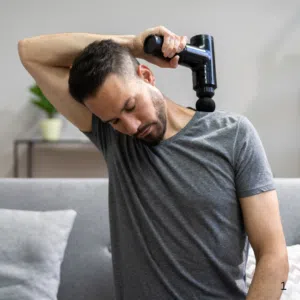
Dr. Danan helps explain relationship of massage guns and vertigo
Article Links: Do Massage Guns Cause Vertigo? (health.com)
Handheld massage guns can be helpful for working out sore muscles. But a new scientific report found that they may also raise a person’s risk of developing vertigo.
The report, published in May in JAMA Otolaryngology, details two cases of patients who developed extreme dizziness after using massage guns on their upper necks and lower scalps.1 Specifically, both developed a common form of vertigo called benign paroxysmal positional vertigo (BPPV), which causes room-spinning dizziness.
The first case involved a 31-year-old woman who developed vertigo 12 hours after using a massage gun on her neck and shoulders. The other patient was 48 years old and had regular episodes of vertigo that doctors suspected was due to massage gun use. Both women’s vertigo symptoms improved after they stopped using the handheld massage guns.
Previous research has linked BPPV to vibration from intense exercise, electric toothbrushes, and certain dental procedures, the report stated, but little is known about the specific link between massage guns and vertigo.
Vertigo is often described as a feeling of dizziness, like you’re in motion when you’re not actually moving. This is different from feeling lightheaded.
Vertigo “is often described by patients as a spinning sensation, with the room or objects around them moving about,” Ilan Danan, MD, sports neurologist at the Center for Sports Neurology and Pain Medicine at the Cedars-Sinai Kerlan-Jobe Institute, told Health.
There are a lot of different types of vertigo, but BPPV is the most common—both patients in Nazarian’s report developed this type of vertigo.12
“BPPV is caused by a temporary malfunctioning of the inner ear canals, resulting in severe dizziness and rapid involuntary movements of the eyes, known as a nystagmus,” said Danan.
”







